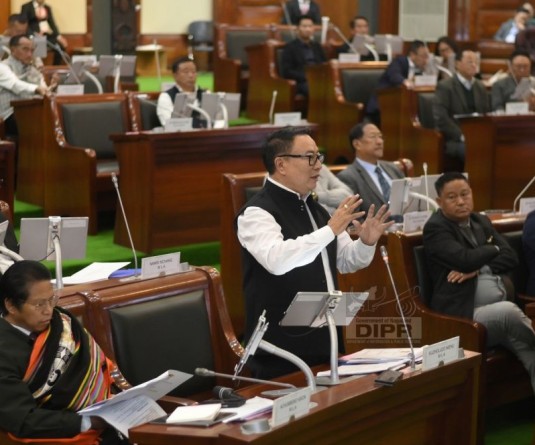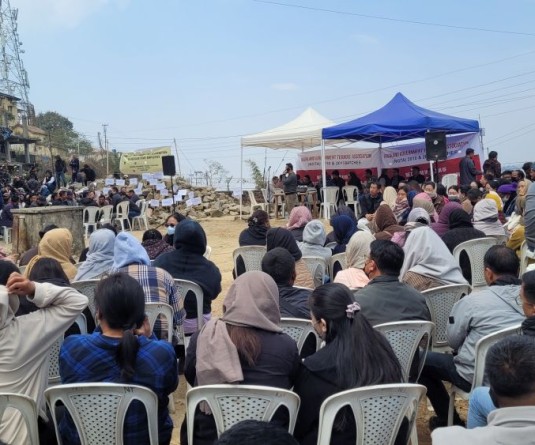
DIMAPUR, JULY 26 (MExN): British parliamentarians were asked to support a mutually honourable and acceptable agreement on the Naga issue outside the framework of the Indian Constitution, on Wednesday at Westminster, London.
As member of the Naga Advisory Panel in the Parliamentarians for National Self-Determination, Professor Timothy Kaping made the appeal by incorporating in his speech the need for “boldness and sagacity” on the part of India. “Much to the unhappiness of the Naga people, contrary to the agreement that no conditions would be imposed, the Indian government is time and again trying to impose the Indian constitution on Nagalim. This of course is unacceptable to the Nagas. Our country Nagalim has got its own culture, history, and constitution,” a copy of his communication stated.
Kaping, a member of the Naga Support Group, was making the third official appearance of the ‘Naga nation’ in the British Parliament since they expressed Naga people’s solidarity with the Parliamentarians for National Self-Determination in May 2006. Making mention of the United Nations charter which clearly supports the self-determination of peoples and nations, Kaping regretted, “But it is a pity that it is unable to effectively control some of its members, which have been shamelessly depriving nations of their right to self-determination for decades.”
“This sad fact is making peoples and nations to believe that the UN is a mere club of states and not an association of nations. It is our hope and prayer that the UN goes for reformation and that it will soon start advocating the aspirations of peoples and nations. This is one of the real ways to achieve world peace.”
Kaping said that since the declaration of independence from the British rule in August 1947, the Nagas have always displayed confidence in resolving conflicts through honest dialogues and treatment on equal footing. “Discarding her promises, India forcibly occupied Nagalim and killed thousands of adults and children, but Nagas responded positively for peace negotiations during the 1960s. A peace commission (consisting of one British clergy and two prominent Indian leaders), which was instituted to oversee the political dialogue and ceasefire, appreciated ‘the desire of the Nagas for self-determination’ and declared that the ‘Naga struggle could not be regarded as a problem of law and order. It is a struggle for national freedom’. Unfortunately, the talks failed owing to India’s insincerity and it was followed by decades of intense fighting.”
“Though many thousands of Nagas had been butchered and innumerable men and women had been tortured by the occupation armed forces, India could not win the war with the Nagas. Hence, Indian political leaders and army generals announced: ‘Military solution is not possible. It is time for India and the Nagas to talk across the table’. The Indian leaders wisely realized that a lasting solution to the long-drawn Indo-Naga issue through political dialogue was inevitable. Therefore, once again, the Nagas came forward for peace negotiations in 1997 under the terms that the talks would be held without any preconditions, at the prime ministerial level, and in third countries. So far, the talks had been held in Amsterdam, Bangkok, Chiang Mai, Geneva, The Hague, Kuala Lumpur, Milan, New York, Osaka, Paris, Vienna, Zurich, etc.
“Acknowledging the right of the Nagas, twenty-four US Congressmen wrote a letter to President Clinton in 1999: ‘We urge you to use your influence to help support self-determination for the people of Nagalim’. And in support of the Indo-Naga peace talks former US President Jimmy Carter wrote to Indian Prime Minister Manmohan Singh in 2005: ‘I am writing today to you and the NSCN leaders to express my appreciation to both parties for the initiative being taken towards a peaceful and lasting resolution’. Many people are working and praying for the success of the Indo-Naga peace process.”
‘Extend ceasefire’
‘Parliamentarians for National Self-Determination’, a group of members of Parliament from the United Kingdom has solemnly requested the Government of India and the National Socialist Council of Nagalim to extend the current ceasefire beyond July 31 2007 and take forward the historic 1997 Indo-Naga peace process with due diligence and adherence to the three point terms, namely talks without pre-conditions, talks at Prime Ministerial level and talks to be held in third countries.
PNSD Chair Lord Nazir Ahmed and Vice Chair Elfyn Llwyd, MP, in their unanimous resolution passed on July 25, made available today, “acknowledged the right of the Naga people to self-determination as enshrined in International Law.” The parliamentarians attested their full dedication to “the noble cause of conflict resolution through democratic and peaceful means.”






